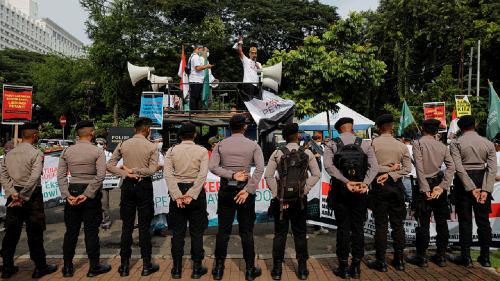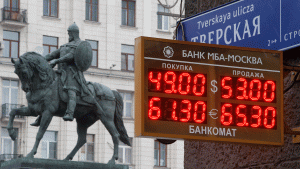Moon Farming, Export Negotiation, and Stagflation
Check out our roundup of the week's top news and research in food, agriculture, and global development.

Top Story
Negotiating Exports
UN Secretary-General António Guterres is pursuing talks with Russia, Turkey, and other countries to restore grain shipments from Ukraine, and fertilizer exports from Russia and Belarus. An estimated 25 million tons of grain are stuck in Ukraine due to Odessa’s port closures. Guterres expressed concern that rising prices caused by the war in Ukraine will exacerbate food, energy, and economic crises in low-income countries—particularly across Africa—and create a global food shortage. The World Bank is providing 30 billion dollars to combat this potential food security crisis.
Council Insights
Offering Guidance on Food Crisis
Distinguished fellow Ertharin Cousin spoke with USAID Administrator Samantha Power and experts from IFPRI, CSIS Global Food Security Program, the Feinstein International Center at Tufts, the Center on Food Security and the Environment at Stanford, and others to discuss the US response to the global food crisis. Read the press release.
Food & Agriculture
Plummeting Palm Oil
Indonesia plans to lift its ban on palm oil shipments in response to protests by smallholder farmers after their palm fruit prices plummeted, putting their livelihoods in jeopardy. Responsible for 60 percent of the world’s palm oil, Indonesia’s ban reverberated around the world, exacerbating effects of rising inflation and disappointing harvests.
Stagflation Warnings
Ahead of the G7 meeting, US Treasury Secretary Yellen and other global leaders warn rising food and energy prices are creating stagflation, depressing output and spending while increasing inflation globally. Inflation is hitting an all-time high in countries around the world—namely the UK, at nine percent—further increasing food and energy prices. Economists are cutting forecasts of global economic growth, and predict stagflation may trigger economic downturns that could worsen food shortages.
Time to Divest
Environmental groups are drawing attention to the severity of the climate emergency, and how it is already accelerating famine, droughts, and poverty, especially in low-income countries. Climate scientists recommend investors immediately transition to renewable energy to rapidly decrease fossil fuel use and maximize renewable energy assets through developing smart grids and efficient long-term storage.
Deeper Dive
How Is Stagflation Defined?
Stagflation occurs when high inflation and slow economic growth happen concurrently, often leading to high rates of unemployment. The war in Ukraine, coupled with slow economic growth from the COVID pandemic, disrupted supply chains and raised energy prices globally, creating fear among economists that a global recession could be on the horizon. This raises the risk of a global food shortage, and puts additional strain on low-income countries.
Data Crunch
Precision’s Promises
Proponents of precision agriculture hail the advancements as an opportunity for farmers to achieve higher crop diversity and lower input use. The value proposition is not straightforward, however, and greatly varies based on a farmer’s crops, available labor, existing equipment needs. Given long lifespans for agricultural equipment and other factors, shifts to field robots will likely not be immediate.
Resilience
Child Labor Rising
After years of decline, rates of child labor have increased across Africa. The International Labor Organization estimates that 2.1 million children work in cocoa production, and millions more in mining and other industries. The economic stresses of the COVID-19 pandemic, recurring crises, and lack of adequate social protections have pushed families to seek additional income, marking the first time in 20 years that progress curbing child labor has stalled, according to UNICEF.
Big Ideas
Moon Farms
Scientists have successfully sprouted seeds in regolith, the material found on the moon’s surface. Using samples collected 50 years ago—and adding water, light, and nutrients—researchers observed growth in less than 48 hours. Although the plants experienced more stress than the control group grown in volcanic ash, the fact that they grew at all is a novel discovery with significant promise for future space exploration.
DC Report
Formula Fly-In
The Biden administration is launching what it calls “Operation Fly Formula,” loosening regulations on overseas baby formula producers and using defense contracts to import formula. 43 percent of retailers were out of baby formula in early May, and some corporations have begun flying in formula from their European facilities. The administration has also invoked the Korean War-era Defense Production Act to require suppliers to prioritize allocating resources to US-based formula manufacturers.
Big Actors
More Bark than Bite
Increasing questions about the African Development Bank’s (AfDB) governance and structure have thrown doubt on the power of its internal watchdogs. Nine independent evaluators of multilateral institutions signed a letter calling for greater accountability at the AfDB in 2020, and the Bank risked losing its AAA credit rating in 2021. The Bank is crucial to addressing mounting stresses on African economies, and millions will feel the consequences if the institution cannot address lingering concerns.
Fighting Food Insecurity
The EU and US are launching a new platform addressing global food security issues through supply chain diversification. The platform will become part of the Trade and Technology Council, with the goal of strengthening the involved countries’ economic ties and cooperation on agriculture issues.
Trade & Commodities
Too Hot to Trade
The government of India imposed a ban on wheat exports in response to surging domestic prices and severe heat-induced reductions in output. Just two days prior to the ban, the government had announced ambitious wheat export goals to mitigate market disruptions caused by the war in Ukraine.
Council Events
Did you miss one of our previous livestreams? Don't worry! They are all available on our website to watch at any time.
Other Upcoming Events
Impact of Food Inflation on Food Insecure Families and the Nutrition Safety Net
Date: May 23
Time: 1:00 p.m. CT
Launch of Africa Catalyzing Action for Nutrition
Date: May 25
Time: 7:00 a.m. CT
Chicago Venture Summit Future-of-Food
Date: May 25-26
Appetites for Change: The Future of Food
Date: June 1
Time: 10:30 a.m. - 5:30 p.m. CT
Land Acknowledgement Statement
The Center on Global Food and Agriculture recognizes it occupies the ancestral land of the Kiikaapoi, Peoria, Kaskaskia, Bodwéwadmi, and Myaamia people. Indigenous communities around the world disproportionately experience the pressures of climate change, global conflicts, and the COVID-19 pandemic, while simultaneously stewarding 80 percent of the world’s biodiversity. These Indigenous tribes and nations are the original owners of this land and continue to be systemically erased by policies and practices that ignore their histories. To learn more about Indigenous foodways and practices, check out our 2022 blog series "Stewardship, Sovereignty, and Solutions."
Related Content
- Embracing Dandelions as Food and Medicine
- Going Beyond Regenerative Agriculture on Tribal Lands
- Expanding "638" to Enhance Native American Food Sovereignty
- Flavors and Culture: Food Systems Through Indigenous Women's Eyes
- A Thanksgiving Legacy: Fighting for Indigenous Food Sovereignty
- Native Food Sovereignty: Strengthening Connection to Culture
- Reconnecting to Indigenous Food Sovereignty Values and Practices
- Embracing Interconnectedness: How Indigenous Foodways Can Save Us




